

Why should leaders increase their EQ? I recently gave a speech on the topic of emotional quotient (also called emotional intelligence) to an audience of over 1,000 people.
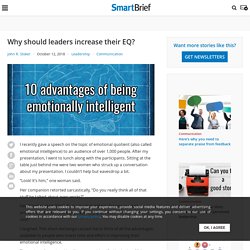
After my presentation, I went to lunch along with the participants. Sitting at the table just behind me were two women who struck up a conversation about my presentation. What happened when one school banned homework — and asked kids to read and play instead. The Reading & Writing Project - Running Records, Foundational Assessments and Benchmarks.
The running record assessment forms provide a book introduction, the typed text, a sidebar of reading characteristics, a scoring guide, comprehension questions with sample responses, and space to take notes and to jot student responses.
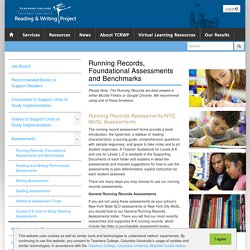
A Teacher Guidebook for Levels A-K and one for Levels L-Z is available in the Supporting Documents of each folder and explains in detail the assessments and includes suggestions for how to use the assessments to plan differentiated, explicit instruction for each student assessed. There are many ways you may choose to use our running records assessments. General Running Records Assessments If you are not using these assessments as your school’s New York State SLO assessments or New York City MoSL, you should look to our General Running Records Assessments folder. New York City Measures of Student Learning Assessments (MoSL) Please note, NYC MoSL information is current as of September 2018. New York State-approved Student Learning Objectives (SLO) Beyond Knowing – The Principal of Change. Recently at a workshop, one of amazing educators in the room talked about the shift in language from a “fixed mindset” to a “growth mindset”.
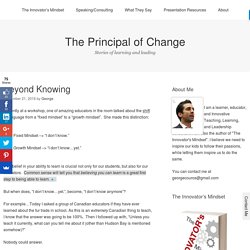
She made this distinction: Fixed Mindset –> “I don’t know.”Growth Mindset –> “I don’t know…yet.” This belief in your ability to learn is crucial not only for our students, but also for our educators. 9 Elephants in the (Class)Room That Should "Unsettle" Us. At a recent morning workshop for school leaders at a fairly small New England public school district, about an hour into a conversation focused on what they believed about how kids learn best, an assistant superintendent somewhat surprisingly said aloud what many in the room were no doubt feeling.
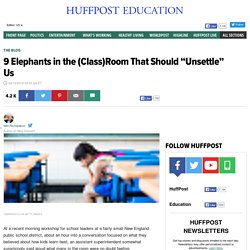
“When I really try to square what I believe about how kids learn and what we practice in our classrooms, it unsettles me,” she said. “And it frustrates me.” As it should. One of the things I’ve come to realize in my many discussions with educators from around the globe is that there are a number of practices in our current systems of schooling that “unsettle” us, primarily because they don’t comport with what Seymour Papert calls our “stock of intuitive, empathic, common sense knowledge about learning.”
Why Kindergarten Is The New First Grade : NPR Ed. "What are some of the things that the monsters like to eat in this story?
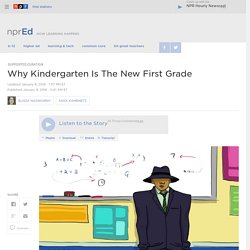
" teacher Marisa McGee asks a trio of girls sitting at her table. McGee teaches kindergarten at Walker Jones Elementary in Washington, D.C. Helping Student Writers Find the Best Evidence. By Sarah Tantillo No matter what grade or subject you teach, sooner or later you find yourself trying to help students write more clearly and convincingly.
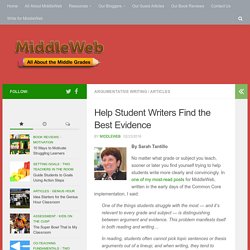
In one of my most-read posts for MiddleWeb, written in the early days of the Common Core implementation, I said: One of the things students struggle with the most — and it’s relevant to every grade and subject — is distinguishing between argument and evidence. This problem manifests itself in both reading and writing… In reading, students often cannot pick topic sentences or thesis arguments out of a lineup; and when writing, they tend to construct paragraphs and essays that lack arguments. I went on to describe roughly six steps we can use to move students from “What’s the difference between arguments and evidence?” Moving students through the steps. Fastcompany. Will wearing a ratty college T-shirt and sweats to bed soon go out of fashion?
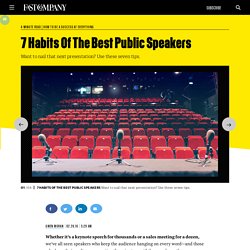
The pajamas industry is growing, and retailers aren't sleeping on how to reinvent the bygone ensemble. What was once a symbol of buttoned-down '50s attire (think Ricky and Lucy in collared PJ sets, tucking into their separate beds) has slowly inched its way back into pop culture. Look no further than popular TV shows—New Girl, House of Cards, or Scandal—to see protagonists clad in chic silk or cotton designs reminiscent of a tidier bedtime era. But while earlier decades cherished the ensemble for its conservatism, today's pajamas differ in terms of comfort, style, and intent. For consumers, the revival is partially inspired by recent Fashion Week runways, an overall trend toward healthier living, increased awareness of the benefits of sleep, and fresh new takes on vintage designs.
6 Reasons Why Kindergarten Is Sucking the Soul Out of Your Child. Editor's Picks 2015, No. nine: Why you should stop testing and start assessing. Both the ISTE Standards for Teachers (2008) and CAST’s Universal Design for Learning principles recommend allowing students to express their ideas and knowledge in a variety of ways.
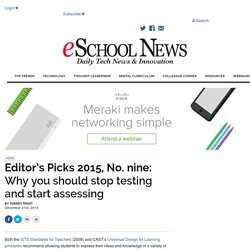
Yet, too often, students are asked to sit at a desk for hours on end to take the exact same multiple choice, short answer, or essay test to demonstrate what they learned. Educational Leadership:Giving Students Meaningful Work:Five Hallmarks of Good Homework. 8 Strategies to Keep Informational Reading Fun. One of the biggest complaints I hear about Common Core is the push toward informational texts.
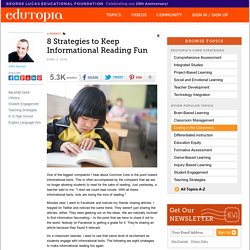
This is often accompanied by the complaint that we are no longer allowing students to read for the sake of reading. Just yesterday, a teacher said to me, "I wish we could read novels. With all these informational texts, kids are losing the love of reading. " Minutes later, I went to Facebook and noticed my friends sharing articles. I hopped on Twitter and noticed the same trend. Teacher spends two days as a student and is shocked at what she learns.
A student takes notes at Woodrow Wilson High School in Washington D.C.
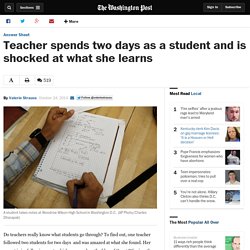
(AP Photo/Charles Dharapak) Do teachers really know what students go through? To find out, one teacher followed two students for two days and was amazed at what she found. Her report is in following post, which appeared on the blog of Grant Wiggins, the co-author of “Understanding by Design” and the author of “Educative Assessment” and numerous articles on education. A high school teacher for 14 years, he is now the president of Authentic Education, in Hopewell, New Jersey, which provides professional development and other services to schools aimed at improving student learning.
Studying With Quizzes Helps Make Sure the Material Sticks. iStock By Samara Freemark, American RadioWorks Roddy Roediger is a psychology professor at Washington University in St. Louis and runs the school’s Memory Lab. Obama Wants 6 Million Children In Preschool By The End Of The Decade. President Barack Obama's new goal of enrolling 6 million children in high-quality preschools by the end of the decade includes 3-year-olds, in addition to the 4-year-olds who are part of his earlier Preschool For All initiative, according to a White House official.
Obama noted the new goal in the middle of a lengthy speech last week at Northwestern University about the economy and domestic priorities. A White House official told The Huffington Post this week, on background, that the new number includes children ages 3 and 4. "If we make high-quality preschool available to every child," Obama said last Thursday, "not only will we give our kids a safe place to learn and grow while their parents go to work; we’ll give them the start that they need to succeed in school, and earn higher wages, and form more stable families of their own. Your paper brain and your Kindle brain aren't the same thing. Can Students ‘Go Deep’ With Digital Reading? Mark Pennington’s students often read on their laptops. Pennington, who’s a reading specialist in Elk Grove near Sacramento, Calif., sees a need to teach kids how to read digitally and stay engaged, and thinks that digital reading will eventually catch up to what kids can do reading print.
When asked if his seventh-graders are more engaged when reading from digital readers or in print, he said it depends — motivation and environment play a big role. Why Reading is Important for Children: The Benefits – Early Moments - Earlymoments.com. Why Physical Education is Important for Academic Skills. How Does the Brain Learn Best? Smart Studying Strategies. Readers absorb less on Kindles than on paper, study finds. 10 tips for getting started with Google Classroom. “Four Things I’ll Do Differently This School Year” : KQED Education. Informal education: What students are learning outside the classroom. Back to School: 3 Question Activities to Connect Students.